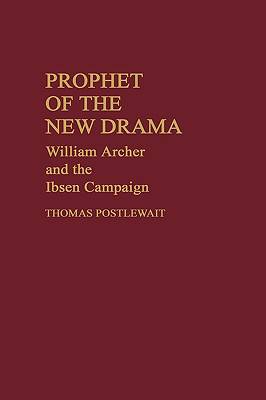
Je cadeautjes zeker op tijd in huis hebben voor de feestdagen? Kom langs in onze winkels en vind het perfecte geschenk!
- Afhalen na 1 uur in een winkel met voorraad
- Gratis thuislevering in België vanaf € 30
- Ruim aanbod met 7 miljoen producten
Je cadeautjes zeker op tijd in huis hebben voor de feestdagen? Kom langs in onze winkels en vind het perfecte geschenk!
- Afhalen na 1 uur in een winkel met voorraad
- Gratis thuislevering in België vanaf € 30
- Ruim aanbod met 7 miljoen producten
Zoeken
€ 161,45
+ 322 punten
Omschrijving
This analytical history is the most comprehensive and accurate record of the Ibsen campaign in London. Postlewait places major emphasis on the activities of William Archer, the theatre critic, translator, and director who zealously campaigned for the acceptance of Ibsen's works in particular and the new drama in general. He argues that proper appreciation of Archer's often devious role as the foremost advocate of Ibsen is vital to understanding how and why Ibsen was ultimately received on the London stage. Postlewait's reassessment challenges all previous histories and critical studies of this theatrical era and confronts the many contradictions of Archer's life and works that have previously clouded more straightforward histories. He presents Archer as a man with a sense of missionary urgency but also as an individual with an often paradoxical character and numerous self-defeating attributes. This process of reconstituting history and reexamining the career of William Archer, especially in light of his close relationships with Bernard Shaw and Elizabeth Robins, reveals the importance, complexity, and even brilliance of a man who may fittingly be called the prophet of the new drama.
Specificaties
Betrokkenen
- Auteur(s):
- Uitgeverij:
Inhoud
- Aantal bladzijden:
- 212
- Taal:
- Engels
- Reeks:
Eigenschappen
- Productcode (EAN):
- 9780313245404
- Verschijningsdatum:
- 21/02/1986
- Uitvoering:
- Hardcover
- Formaat:
- Genaaid
- Afmetingen:
- 152 mm x 229 mm
- Gewicht:
- 480 g

Alleen bij Standaard Boekhandel
+ 322 punten op je klantenkaart van Standaard Boekhandel
Beoordelingen
We publiceren alleen reviews die voldoen aan de voorwaarden voor reviews. Bekijk onze voorwaarden voor reviews.









